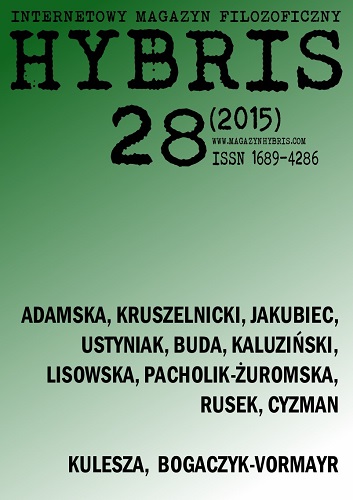Preskryptywna eksplikacja tezy o normatywności znaczenia i trudności z nią związane
DOI:
https://doi.org/10.18778/1689-4286.28.06Słowa kluczowe:
normativity of meaning, semantic prescriptivism, prima facie obligations, Kripke, BoghossianAbstrakt
The aim of this paper is to analyse prescriptive interpretations of the thesis that meaning is normative, which was introduced by Saul Kripke and later developed by Paul Boghossian. We are going to show that meaning prescriptivism is counter-intuitive and has implausible consequences. Attempts to save prescriptive interpretations by appealing to prima facie obligations or „normativity of judgment” are unsuccessful.
Bibliografia
Baker, G. P. and Hacker, P. M. S., 1984, Scepticism, Rules and Language, Oxford: Blackwell.
Zobacz w Google Scholar
Blackburn, Simon, 1984, The Individual Strikes Back, „Synthese” 58, ss. 281–301.
Zobacz w Google Scholar
DOI: https://doi.org/10.1007/BF00485244
Boghossian, Paul, 1989, The Rule-Following Considerations, “Mind” 98, ss. 507–549.
Zobacz w Google Scholar
DOI: https://doi.org/10.1093/mind/XCVIII.392.507
Boghossian, Paul, 2005, Is meaning normative?, [w:] A. Beckermann, C. Nimitz (red.), Philosophy — Science — Scientific Philosophy, Pradenborn: Mentis, ss. 206–218.
Zobacz w Google Scholar
Brandom, Robert, 1994, Making it Explicit, Cambridge, Massachusetts: Harvard University Press.
Zobacz w Google Scholar
Dummett, Michael, 1978, Truth and other Enigmas, Cambridge, Massachusetts: Harvard University Press.
Zobacz w Google Scholar
Ebbs, Gary, 1997, Rule-Following and Realism, Cambridge, Massachusetts: Harvard University Press.
Zobacz w Google Scholar
DOI: https://doi.org/10.4159/9780674034419
Frege, Gotlob, 1977, Pisma semantyczne, Warszawa: PWN.
Zobacz w Google Scholar
Glock, Hans-Johann, The Normativity of Meaning Made Simple, [w:] A. Beckermann, C. Nimitz (red.), Philosophy — Science — Scientific Philosophy, Pradenborn: Mentis, ss. 219–241.
Zobacz w Google Scholar
Glüer, Kathrin, and Pagin, Peter, [ROK], Rules Of Meaning and Practical Reasoning, “Synthese” 117, ss. 207–227.
Zobacz w Google Scholar
DOI: https://doi.org/10.1023/A:1005162503125
Hattiangadi, Anandi, 2006, Is Meaning Normative?, “Mind and Language” 21, ss. 220–240.
Zobacz w Google Scholar
DOI: https://doi.org/10.1111/j.0268-1064.2006.00312.x
Hattiangadi, Anandi, 2007, Oughts and Thoughts: The Rule-Following and the Normativity of Content, Oxford: Oxford University Press.
Zobacz w Google Scholar
DOI: https://doi.org/10.1093/acprof:oso/9780199219025.001.0001
Kripke, Saul, 2001, Nazywanie a konieczność, Warszawa: Fundacja Aletheia.
Zobacz w Google Scholar
Kripke, Saul, 2007, Wittgenstein o regułach i języku prywatnym, Warszawa: Fundacja Aletheia.
Zobacz w Google Scholar
McDowell, John, 1984, Wittgenstein on Following a Rule, “Synthese” 58, 326–363.
Zobacz w Google Scholar
DOI: https://doi.org/10.1007/BF00485246
Posłajko, Krzysztof, 2009, Spór o normatywność znaczenia w analitycznej filozofii języka, „Kwartalnik Filozoficzny” 37, ss. 124–55.
Zobacz w Google Scholar
Ross, W. D, 2002, The Right and the Good, Oxford: Clarendon Press.
Zobacz w Google Scholar
DOI: https://doi.org/10.1093/0199252653.001.0001
Searle, John, 1958, Proper Names, “Mind” 67, ss. 166–173.
Zobacz w Google Scholar
DOI: https://doi.org/10.1093/mind/LXVII.266.166
Whiting, Daniel, 2007, The Normativity of Meaning Defended, “Analysis” 67 (2007), ss. 133–140.
Zobacz w Google Scholar
DOI: https://doi.org/10.1093/analys/67.2.133
Wikforss, Åsa, 2001, Semantic normativity, “Philosophical Studies” 102, ss. 203–206.
Zobacz w Google Scholar
DOI: https://doi.org/10.1023/A:1004746319850
Wittgenstein, Ludwig, 1993, O pewności, Warszawa: Biblioteka Aletheia.
Zobacz w Google Scholar
Wittgenstein, Ludwig, 2005, Dociekania filozoficzne, Warszawa: PWN.
Zobacz w Google Scholar
Pobrania
Opublikowane
Jak cytować
Numer
Dział
Licencja

Utwór dostępny jest na licencji Creative Commons Uznanie autorstwa – Użycie niekomercyjne – Bez utworów zależnych 4.0 Międzynarodowe.






